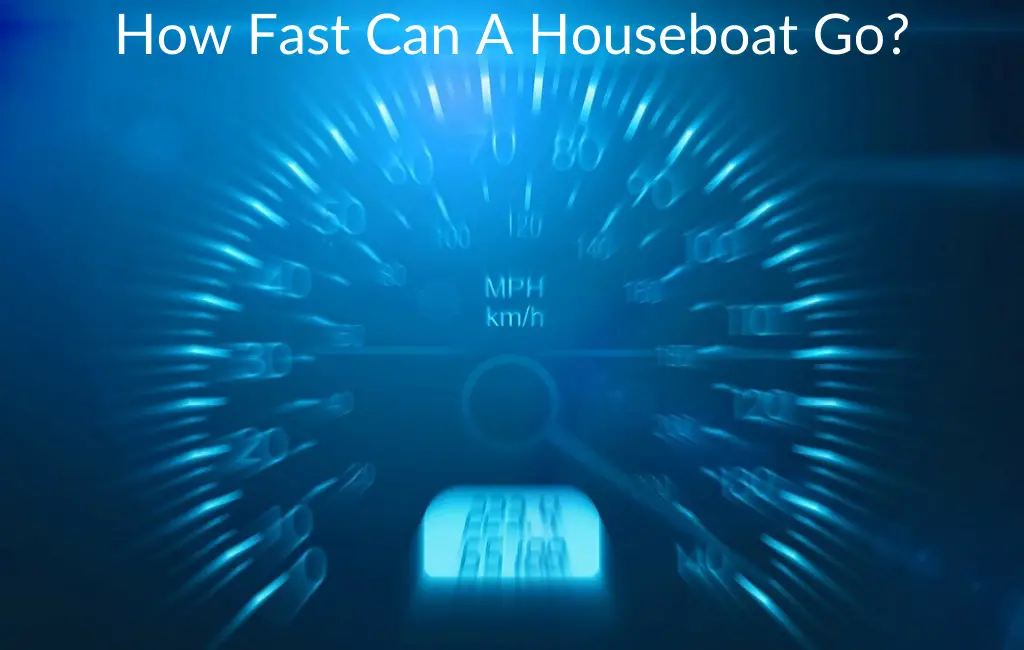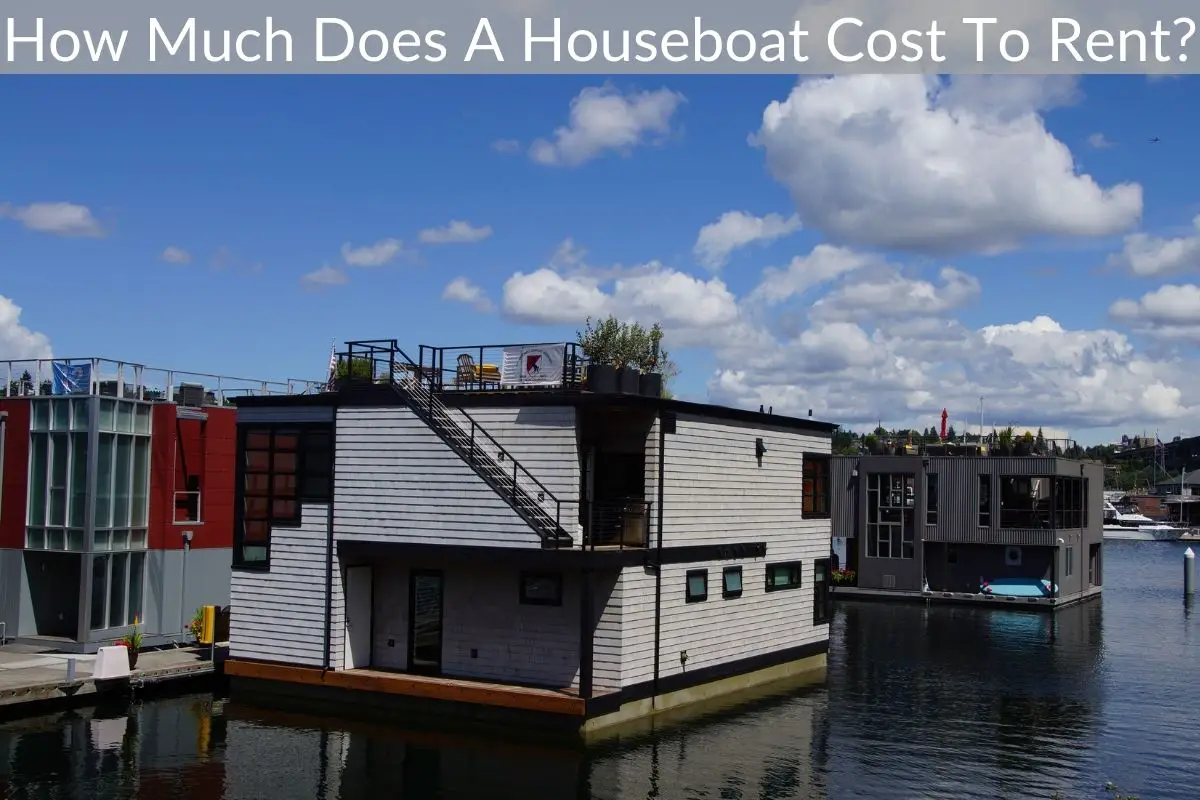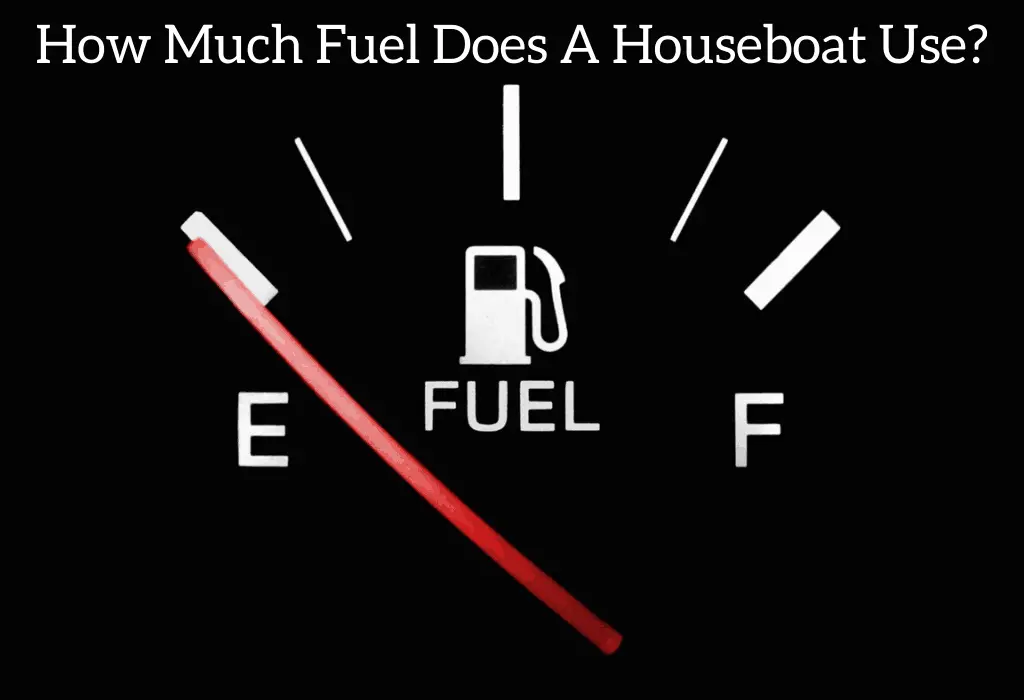You may be wondering what the gas mileage of a houseboat is. Of course it varies but in general what can you expect?
*This post may contain affiliate links. As an Amazon Associate we earn from qualifying purchases.
Most houseboats will use fuel at about a rate of 3-4 gallons per hour of use. So if you drive your houseboat for 5 hours you can expect to use 15-20 gallons of fuel.
Actual fuel economy will depend on how fast you are going and whether you have it “wide open” or are just trolling along. A houseboat at top speed will get 3-4MPG while a trolling houseboat could get half of that.
Of course the actual fuel economy that you will get with your houseboat will vary depending on how much weight you are carrying, the age of the houseboat, whether you are going with the current or against it, and other such factors.
The best answer is that new houseboats typically have better fuel economy. However, this is not always the case. If you are considering buying a used houseboat, ask to test it for a few hours to determine its fuel economy. A diesel engine is also more fuel efficient than a gasoline engine. In addition, displacement hulls have a maximum speed.
Diesel engines are more fuel-efficient than gasoline engines
If you’re looking for a houseboat engine, diesel is the way to go. They get better gas mileage than gasoline engines. And diesels are better thermally than gasoline. It’s all about the ratio of air to fuel. It’s no secret that diesels are more efficient at converting energy. But did you know that gasoline engines aren’t nearly as efficient as diesels?
Another benefit of diesel engine is its lower cost. While gasoline costs a lot less, you need to burn more fuel than you save with diesel. And the average boater won’t see this benefit, either. Diesel houseboats may cost upwards of $20,000, and the savings on fuel will only amount to about $0.50 per gallon. In order to break even, you’ll need to burn 40,000 gallons of fuel.
In addition to lower fuel consumption, diesel engines also carry more weight. They also produce less noise and smoke, and have a higher torque. Diesel engines have a higher compression ratio, which means they develop more power with less fuel. This is especially useful if you have a houseboat with a heavy load and want to make it faster. Although diesel engines are more expensive initially, the fuel savings will eventually pay off.
While gas is less expensive, diesel engines are more efficient. They produce less CO, which is not life-threatening, but can cause nausea and dizziness. Another benefit is that a diesel engine will last a longer time and require less maintenance than a gasoline engine. In addition, diesel is more efficient on thermal efficiency. These two features make diesel an excellent choice for houseboats.
Displacement hulls have a maximum hull speed
While displacement hulls can be either fully or partially symmetric, they both have a maximum cruising speed. The maximum hull speed of a displacement hull depends on the vessel’s length and wave-making resistance. The following table provides the maximum hull speeds for each type of displacement hull. Displacement hulls have higher maximum cruising speeds than planing hulls.
Full displacement hulls are common in large cruise ships, sailboats, and trawler yachts. They achieve high fuel efficiency but have a constrained maximum speed. A forty-foot trawler can reach 8 knots (9 MPH) while still maintaining good fuel efficiency. However, displacement hulls tend to roll badly in a seaway, requiring stabilizing equipment to maintain proper balance.
The maximum displacement hull speed is determined by a formula. The square root of the hull’s waterline length, divided by 1.34, gives the maximum displacement speed. For example, a displacement hull with a 36-foot waterline length has a maximum speed of 8.04 knots. Multihulls and bulbous hulls also have higher top speeds than monohull displacement boats.
A displacement hull’s maximum speed is dependent on the wetted surface area and wave-making resistance. Appendage drag and surface tension are also minor considerations. As the wetted surface area increases, the horsepower required to maintain a constant boat speed will increase. Generally, a displacement hull’s hull speed is only achieved in calm seas, so a displacement catamaran with two skinny hulls will go faster than a monohull with a single skinny wing.
Maximum distance a boat can travel on a single tank of gas
Generally, a houseboat can travel around 1400 nautical miles on a single tank of gasoline. This distance may sound a bit low, but it’s not impossible to travel across the country in a single tank of gas. The maximum distance a houseboat can travel on a single tank of gas depends on a variety of factors. Obviously, larger boats will need bigger fuel tanks, so you’ll need more fuel to cover a long distance.
The type of boat you have will influence your boat’s fuel efficiency. In general, smaller boats will use less fuel than larger models. Although you may not be able to cruise as far, smaller boats are more efficient. During cruising, a small boat uses approximately three to eight gallons of gas. However, the distance you can cover will vary depending on the type of boat you have and the speed of the boat.
You should ask your dealer or salesperson about the maximum distance a houseboat can travel on gallons of gas. Typically, a 150 horsepower engine will burn about 15 gallons of fuel per hour. The actual figure can vary by up to 20 percent. When you are shopping for a new houseboat, make sure to ask to test-drive it for at least two hours.
Average speed of a houseboat
The average speed of a houseboat depends on many factors. The type of houseboat, size, and engine capacity can affect how far it can travel. While the fastest houseboats reach up to 17mph, most cruise at eight to ten miles per hour. Depending on the location and type of houseboat, this speed can be lowered or increased. Here are some of the best tips for houseboating. Keeping the average speed in mind will help you avoid accidents.
Many houseboats weigh between 10,000 and 20,000 pounds, and some are even heavier. The speed of these vehicles is limited by their size and weight. The speed at which they move is limited by the weight of their crew and their luggage. If they move too quickly, the water could flood or even sink them. It is also impossible for a houseboat to move fast enough to accommodate everyone. Furthermore, houseboats can’t sail fast enough to carry the weight of people, luggage, fuel, and other necessities.
Although many states do not require a special license for driving a boat, it’s important to consider that houseboats are heavy and slow. Besides, houseboats can only travel eight to ten mph – the same as a normal vehicle. Therefore, it is best to plan your berths carefully before you go out on your trip. You’ll also need to plan where you’ll berth your boat to avoid getting stuck in a mud hole.
Fuel tanks last 15 to 20 years
Most houseboats require high-capacity fuel tanks for cruising power. They are available in steel, aluminum, and composite materials. While composite and aluminum fuel tanks can last up to fifteen years, they are not maintenance-free. Steel and aluminum tanks can degrade quickly. To replace them, remove the engines, generator, joinery, and cabin soles. Proper maintenance and repair can extend their lives.
Ensure that you inspect the fuel tank regularly. Most houseboats have fuel tanks tucked underneath the side decks. This space has very little clearance between the top of the tank and the beams. As a result, only the most scrupulous owner will notice the puddle. The damage goes unnoticed for years and is usually undetectable until the tank top begins to rust through. If it leaks, water may be filling the fuel filter.
A fuel tank can last for fifteen to twenty years on a houseboat. Proper maintenance will help the tank last 15 to 20 years. A fuel tank is a major component of a boat. Proper maintenance is essential for long-term fuel use. Most tanks are built to last 15 to 20 years if properly cared for. ABYC standards recommend that a boat’s fuel tank be installed and properly maintained. Properly installed tanks have airflow around them. Avoid moisture-absorbing materials from being stored near the tank. Another source of continued exposure to seawater is a leaky deck fill or spraying shaft seal.
If the tank is more than 10 years old, you can replace it with a new one. If it’s metal, this shouldn’t be an issue. But if it’s plastic, check that it has epoxy barrier coating on its interior. Otherwise, you may have to replace the tank altogether. Just remember that your tank should be installed by a professional, and the tank will be approved by the EPA.
Cost of a tank of gas for a houseboat
A houseboat needs a tank of gas to travel for about 100 miles, so you need to figure the cost of a tank of gasoline per hour of use. Houseboats are generally more fuel efficient than cars, but this is not always the case. Before purchasing a houseboat, make sure you take a test drive. A good way to figure out how much a tank of gas will cost is to make a couple of trips with the boat.
Some houseboat owners do not sympathize with motorists – Jeff Pauli, the owner of a 46-foot houseboat on Trinity Lake, Northern California, buys 25 gallons of gas at a roadside station and brings it onto his boat, avoiding the marina fee of $4.25 per gallon. He then moors his houseboat in a small cove three miles away from the harbor, where he estimates he burns up to 5 gallons of gas per weekend. Houseboat manufacturers say Jeff Pauli’s strategy isn’t unique; wealthy boat owners don’t care about gas costs, but many boaters don’t.
The cost of fuel varies depending on the size of the houseboat, the type of engine, and the distance traveled. A 100-mile trip in a car usually costs between $10-15. On the other hand, a houseboat can travel longer distances without having to pay full-price for fuel. The cost of running a houseboat is much less than what you’d pay to sail the length of the Mississippi. Diesel engines are also more fuel efficient than gasoline engines, but they are noisy, and can interfere with conversations.









